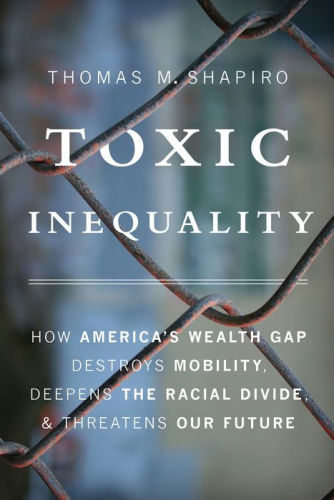
Toxic Inequality
How America's Wealth Gap Destroys Mobility, Deepens the Racial Divide, and Threatens Our Future
کتاب های مرتبط
- اطلاعات
- نقد و بررسی
- دیدگاه کاربران
نقد و بررسی

January 15, 2017
An examination of economic inequality--unsurprisingly, the title refers to race as well as economic class.Shapiro (The Hidden Cost of Being African-American: How Wealth Perpetuates Inequality, 2004, etc.) is a professor of law and social policy at Brandeis University, where he directs the Institute on Assets and Social Policy. His analysis stems from research conducted within the institute's Leveraging Mobility Study, consisting of interviews conducted with urban families from 1998 to 1999 and then between 2010 and 2012. During that decade-plus, the country suffered through a severe recession, crises of unemployment, housing, and banking, and shifts in federal and state welfare policy through which "the safety net has been shredded." The key distinction that Shapiro makes is between income and wealth, too often considered together. Tax and economic policy tend to favor wealth--through mortgage interest exemptions, inheritance policies, private college endowments, corporate retirement plans, etc. Thus, there are those who seem to have a comfortable salary, in the $100,000 range, but who have little wealth to sustain them if they lose their jobs or their health or if the value of their homes plummet. The majority of the author's subjects come from minority populations, whose jobs are less secure (and offer fewer benefits) and whose neighborhoods are shakier. "We must understand wealth and income inequality together with racial inequality," writes the author, and the toxicity lies within that triangle. Much of what the study reveals the reader will have likely suspected, and the prose is simple and straightforward. Yet Shapiro makes it clear that many people suffer due to circumstances well beyond their control--they do everything right and still end up on the wrong side of the ledger--and that the country could afford to address this by refocusing its priorities. A strong case that deserves a wider readership than just policy wonks.
COPYRIGHT(2017) Kirkus Reviews, ALL RIGHTS RESERVED.

February 15, 2017
Shapiro (law, social policy, Brandeis Univ.; The Hidden Cost of Being African American) evaluates wealth disparities among African Americans and compares them to those of white Americans. He argues that the differences must be understood in tandem with racial inequality. Similar to the experiences chronicled in memoirs by Dalton Conley (Being Black; Living in the Red) and Ta-Nehisi Coates (Between the World and Me), Shapiro's compares lifestyles and family experiences, allowing readers to consider inequality through the eyes of families who experience economic and social disparity firsthand. The author's interviews, research, and decadeslong case studies explore the reality of the choices that impoverished families need to make. These decisions impact earning power and further highlight the differences between income and wealth, especially in matters such as home equity, employer benefits, and sources of financial assistance. VERDICT A thorough read on inequality when considering race, wealth, and wealth gaps. Although heavy on sociological research, Shapiro's work is easy to follow and valuable for students and academics interested in expanding their knowledge on factors that affect economic mobility among marginalized groups.--Cicely Douglas, Delray Beach P.L., FL
Copyright 2017 Library Journal, LLC Used with permission.

























دیدگاه کاربران